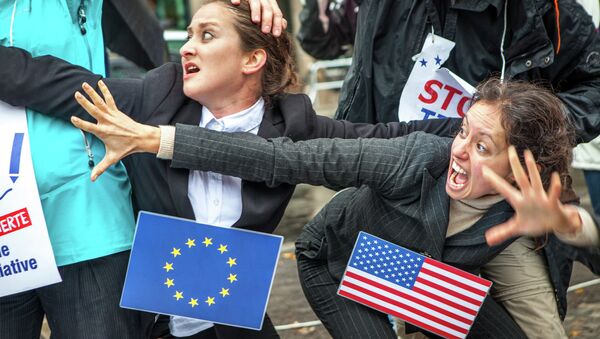Ms Wickett argues that many of the pivotal Western-established institutions and structures that drove the international agenda in the 20th century — like NATO, the UN and even the IMF — "have become increasingly dysfunctional or unfit for purpose, and are increasingly ignored (like the UN) or replaced."
She believes that as a result, the West's "contextual advantage" in dictating the norms by which everyone else functions, is fading away.
Different Values, Different Policies
While shared values and beliefs between Europe and North America have historically been a driving factor in the transatlantic alliance, many have commented on the divergence in priorities and values between Europeans and Americans in recent decades.
Ms Wickett notes that although American public opinion appears to be getting closer to Europe on issues like gay rights and recreational drug use, "there is clear evidence that differences of opinion are becoming more entrenched."
The difference in public values has also been demonstrated in national policy, she says.
"Policy divides between the US and Europe are commonplace, but recently the list of differences (and the degree of difference of opinion) appears to be growing."
Many commentators have pointed to the split in Western opinion over whether to be involved in the proposed Chinese-led Asian Infrastructure Investment Bank (AIIB) initiative — seen as a direct rival to the US-led World Bank and IMF — as an example of how Washington and its European partners do not necessarily read from the same page when it comes to international relations.
"The split over joining the AIIB is the most recent of these [policy divides], being a visible symptom of a larger fundamental difference of opinion on Asia. But other issues that divide include actions in Libya in 2011, Syria today, Russia, support for NATO, energy independence and what to do about climate change," she said.
The rise of emerging markets like China, and to a lesser extent Brazil, known as the ‘rise of the rest,' is also threatening to undermine the transatlantic grip on power that dominated the 20th century, researchers have said.
The strength in relations between alliances like BRICS, which includes Brazil, Russia, India, China and South Africa, has only reinforced beliefs among some that the world is becoming more internationally competitive.
The End of Special Relationships?
A number of incidents have taken their toll on US-European relations in recent times, with revelations of US spying on European allies, debate over the role of NATO, involvement in overseas conflict in the Middle East and negotiations for the Transatlantic Trade and Investment Partnership (TTIP) all creating tension on both sides.
Donald Trump reportedly "unstoppable" in US. Jeremy Corbyn storming in UK. The #SpecialRelationship is gonna be interersting….
— Joe Murphy (@JoeMurphyLondon) 27 августа 2015
Ms Wickett believes that these factors have had an impact on the overall relationship between Europe and the US — politically and socially.
"Anecdotally, the evidence is also not good. Over the past four years the general tone of conversations in Europe about the US has changed, due to huge uncertainty about whether the US is going to continue to play the same role it has in the past or whether it will leave Europe to face its challenges alone.
"Meanwhile, in the US the conversation around whether Europe will step up (particularly in security) has heightened tremendously. Four years ago, no one thought to question the transatlantic relationship. Today, on both sides, there is a lack of confidence."
Key to the US-Euro bond has been a number of ‘special relationships' on both sides of the Atlantic.
'If the US and Europe drift apart, there will be grave consequences for Western global leadership' — @xeniawickett: http://t.co/oV2ezMZUzO
— Chatham House US (@CH_USP) 27 августа 2015
Arguably the most important of these special relationships has traditionally been held between Britain and the US. However in recent years many commentators have pointed out how a shift in global priorities has led to a reduction in the necessity and closeness of the Washington-London special relationship.
If current trends continue, Ms Wickett warns that "a weak US-UK relationship could cause significant trouble for the wider US-Europe relationship," which could put the West's role as global dictator of terms in doubt.





